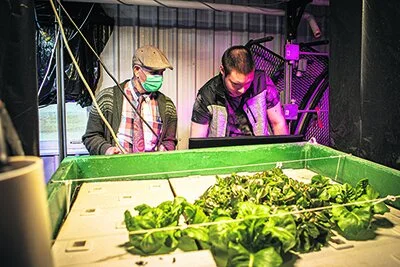Despite ongoing challenges that have been made worse by the pandemic, Canadians have many reasons to be proud of our health systems. Our hospitals are among the best in the world. Our doctors, nurses, surgeons and specialists are dedicated professionals who consistently deliver the highest standards of care. Our universities produce ground-breaking research that supports and improves lives every day.
Read MoreRetinopathy is a serious complication of diabetes that can develop in anyone with type 1 or type 2 diabetes. One in three people with diabetes has retinopathy, and one in 10 will develop a vision-threatening form of the disease.
Read MoreNew bursaries are a critical step toward removing barriers for under-represented groups
While Douglas College has one of the most diverse student populations in British Columbia, a recent review of the post-secondary institution’s awards, bursaries and scholarships identified a gap in financial aid and motivated the creation of a campaign to raise funds to better support Indigenous and immigrant students.
Read MoreCherylene Pinaroc was 24 years old when she was diagnosed with type 2 diabetes. She recalls her shock as she tried to digest the news her doctor delivered: “My first reaction was that this couldn’t be happening. I was dumbfounded,” she says.
Read MoreDecades of research and development leadership is allowing Canada’s oil sands industry to hit the ground running on a steady path to net zero by 2050.
Read MoreThirty-five years ago, when Elaine Gerrie moved into the family business, Gerrie Electric, in Burlington, her father Ken, who founded the company in 1957, welcomed her with open arms. “He was brilliant,” she says about the way he encouraged her and her sister, Heather, who also joined the company post university, to “follow our passion.
Read MoreAs digital transformation sweeps through the Canadian economy, cyber threats are becoming more plentiful and sophisticated. The need for robust cybersecurity measures has never been more critical, which is fuelling increased demand for professionals with cybersecurity expertise. This surging demand is running up against a tough reality – an acute shortage of trained cybersecurity professionals.
Read MoreIn 1918-19, influenza swept the globe in deadly waves. It is thought to have started in the American Midwest before spreading to Europe and the rest of the world. Aiding its stealthy – and largely unchecked – advance was the fact that countries were hesitant to publicly acknowledge that they were battling an epidemic at home. Many were participants in World War I and were concerned that enemies would take advantage or that allies would halt trading activities.
Read MoreResearchers and mental-health service providers continue to build evidence and refine practices to give individuals with psychosis and schizophrenia the best opportunities to achieve “functional recovery.”
Read MoreDermatologist Dr. Geeta Yadav tells the story of one of her patients, an Indo-Canadian man with severe eczema, who told her he had waited nine years to be correctly diagnosed. “I was able to give him treatment that made him 100 per cent better in a matter of two months,” says Dr. Yadav. “It is awful to imagine that someone would have to suffer like that because the diagnosis wasn’t made for so long and the severity wasn’t identified sooner.”
Read MoreJust a few decades ago, schizophrenia was known as a “kiss of death” diagnosis. The prevailing view was drained of all hope: individuals with this form of mental illness had no chance to recover.
Read More“How does this work?” That’s a question Keelan Hyde has always been keenly interested in, from his parents’ first computer to the internet of things (IoT) to linking devices to gain new – and perhaps surprising – results.
Read MoreWhen a local brewery encountered difficulties with filling craft beer into cans, a partner known for technical expertise and innovation came to mind: the Southern Alberta Institute of Technology (SAIT). There, a group of students in the mechanical engineering technology program got to work on designing a solution for automating the canning process.
Read MoreOne of the worst nightmares as a parent is not being able to help when your child is in pain. But what if you don’t even realize they are suffering?
Read MoreCanadore College, headquartered in North Bay, Ontario, has a proven track record with innovative applied research specifically designed to meet the needs of industry. Now it’s about to expand on that reputation and move into the realm of delivering reliable and safe drinking water systems to Indigenous communities. As part of its Clean Water Initiative, Canadore is creating a Clean Water Learning Lodge on its College Drive Campus to develop a comprehensive platform of products, services and education programs. The outcomes will include programs tailored to the needs and values of First Nations, and will inspire Indigenous learners to take on fulfilling careers in water management.
Read MoreIn sudden cardiac arrest, every minute that passes before the heart is restarted counts. When the brain is deprived of oxygen for more than four to six minutes, the risk of irreparable damage increases exponentially.
Read MoreMore than ever, Canadians pay close attention to food product labels. They choose healthy options and want to support brands committed to sustainability and corporate social responsibility.
Read MoreCanadian charities do tremendous work in communities across the country by channelling donor funds into causes that make a critical difference to the lives of people in need and to our world.
Read MoreWater plays a central role in every aspect of society, from health and food security to economic development. Disruptions to water supplies – for example, due to the floods, droughts or wildfires that happen with increasing frequency across Canada and the world – should serve as wake-up calls and inspire action.
Read MoreHealth crises tend to reveal health inequities and health-care gaps. The COVID-19 pandemic, for example, illustrated the need to make Canada’s health systems more resilient, find a way to efficiently mobilize and integrate new knowledge, and actively engage community partners, especially those representing marginalized and underserved populations.
Read More



















